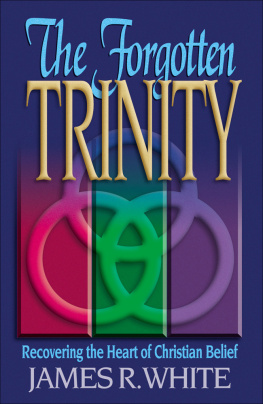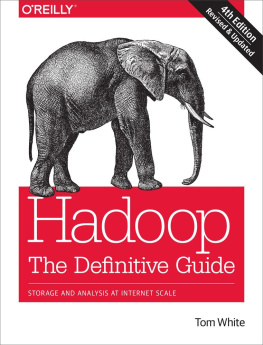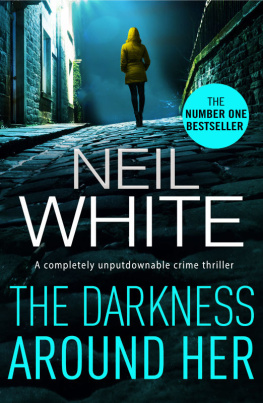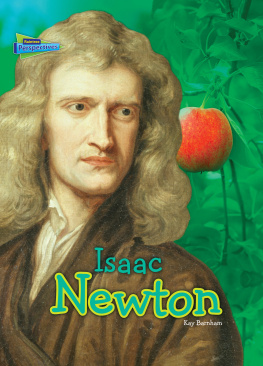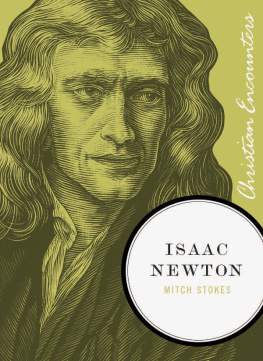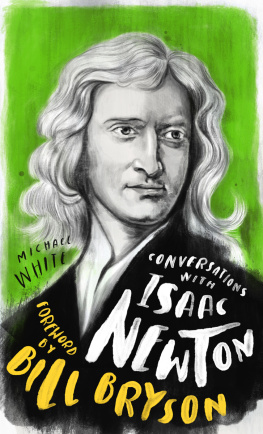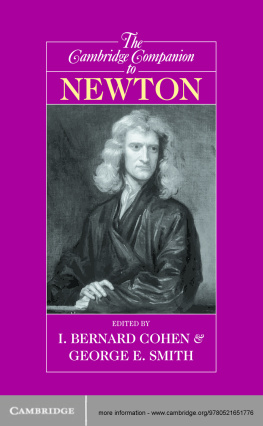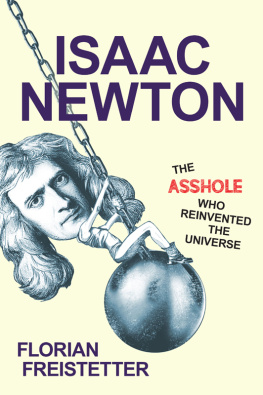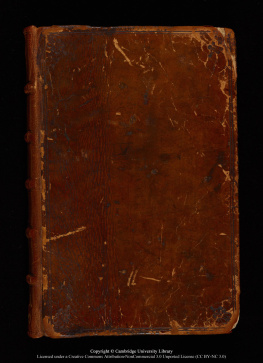White - Isaac Newton: The Last Sorcerer
Here you can read online White - Isaac Newton: The Last Sorcerer full text of the book (entire story) in english for free. Download pdf and epub, get meaning, cover and reviews about this ebook. year: 2015, publisher: HarperCollins Publishers, genre: Non-fiction. Description of the work, (preface) as well as reviews are available. Best literature library LitArk.com created for fans of good reading and offers a wide selection of genres:
Romance novel
Science fiction
Adventure
Detective
Science
History
Home and family
Prose
Art
Politics
Computer
Non-fiction
Religion
Business
Children
Humor
Choose a favorite category and find really read worthwhile books. Enjoy immersion in the world of imagination, feel the emotions of the characters or learn something new for yourself, make an fascinating discovery.

- Book:Isaac Newton: The Last Sorcerer
- Author:
- Publisher:HarperCollins Publishers
- Genre:
- Year:2015
- Rating:3 / 5
- Favourites:Add to favourites
- Your mark:
- 60
- 1
- 2
- 3
- 4
- 5
Isaac Newton: The Last Sorcerer: summary, description and annotation
We offer to read an annotation, description, summary or preface (depends on what the author of the book "Isaac Newton: The Last Sorcerer" wrote himself). If you haven't found the necessary information about the book — write in the comments, we will try to find it.
Isaac Newton: The Last Sorcerer — read online for free the complete book (whole text) full work
Below is the text of the book, divided by pages. System saving the place of the last page read, allows you to conveniently read the book "Isaac Newton: The Last Sorcerer" online for free, without having to search again every time where you left off. Put a bookmark, and you can go to the page where you finished reading at any time.
Font size:
Interval:
Bookmark:

To Bill Hamilton: for getting the ball rolling
This strange spirit, who was tempted by the Devil to believe he could reach all the secrets of God and Nature by the pure power of mind Copernicus and Faustus in one.
MAYNARD KEYNES
A ccording to a list of the most influential people in history, The 100, Isaac Newton ranks number 2 after Muhammad and ahead of Jesus Christ. This position is justified by his unparalleled contributions to science principles that have moulded the modern world. Yet Newton was not the man that history has claimed him to be. More than any other scientist in history, Newtons image has been protected by his disciples and by generations of biographers who have produced inaccurate and sometimes totally false accounts of his life. Not until the 1930s did the real Isaac Newton begin to emerge from the mists of history into the light of critical analysis. Amazingly, it has taken since then to shrug off the final deceits of those who wished to perpetuate the myth that Newton was in some way omnipotent, beyond the baser mundanities of human existence; that he was the pure, distilled essence of scientific inquiry genius unsullied.
The hagiographic accounts began within a year of Newtons death. William Stukeley, who is today better remembered as a scholar of Druidism and ancient mythology, was Newtons first biographer. His Memoirs of Sir Isaac Newtons Life, written during the 1720s, is a devotional account of his heros life, based uniquely upon first-hand experience. Stukeley knew Newton well during the final decade of his life, and because of this the Memoirs is an important book. But, like many of Newtons later biographers, Stukeley was blinkered by adoration: he saw Newton as a demigod, almost immortal and utterly without fault.
Sir David Brewsters Memoirs of the Life, Writings, and Discoveries of Sir Isaac Newton, published in 1855, is a worthy successor to Stukeley and contributes much to our understanding of Newton, but again it is tarnished by the authors lack of objectivity. Brewster, like others, ignored evidence that did not fit his image of Newton; he decided to paint a one-sided view that merely reinforced the image that Newton himself tried to establish for posterity, without questioning the many contradictions in the scientists long and complex life.
There is no question of the greatness of Newtons work, nor of his intellect. But, just as his most famous work, the Principia Mathematica, is a highly sophisticated and complex description of the mechanistic workings of the universe based upon simple, easily understood truths, so too was his personality far more twisted and convoluted than orthodox historians of science would have us believe.
Newton was above all a secretive man, a man coiled in upon himself, detached from the world, and for long periods of his life he was secluded from the everyday current of affairs. For much of his working life he studied and experimented alone in his college rooms and in his laboratory nearby. In many respects, he was nonconformist from an early age, shunning the simple rural life of his family, living in self-imposed isolation at university, refusing to take holy orders. He subscribed to Arianism the doctrine of an heretical sect which denied the principle of the Holy Trinity when public awareness of such beliefs would have wrecked his career. And, most importantly of all, he was an alchemist.
By the time biographers came to consider his life, Newton was dead and the need to hide his religious leanings had gone. But what stuck in the craw of those early biographers was a body of material found in Newtons vast library and within his huge collection of papers and notebooks that made it very clear that the most respected scientist in history, the model for the scientific method, had spent more of his life intensely involved with alchemy than he had delving into the clear blue waters of pure science. It also confirmed what a few of Newtons close friends had known during his lifetime: that he had expended a vast amount of his time studying the chronology of the Bible, examining prophecy, investigating natural magic, and, most of all, attempting to unravel the hermetic secrets the prisca sapientia.
The real life story of Isaac Newton, the neurotic, the obsessive, driven mystic, began to emerge only in 1936, when a collection of Newtons papers, considered to be of no scientific value when offered to Cambridge University some fifty years earlier, was purchased at Sothebys by the distinguished economist and Newton scholar John Maynard Keynes. (He bequeathed it to Kings College, Cambridge, when he died ten years later.)
After studying the contents of Newtons secret papers those documents, manuscripts and notebooks ignored by the hagiographers in 1942 Keynes delivered a lecture to the Royal Society Club in which he portrayed an altogether different and highly controversial image of historys most renowned and exalted scientist:
In the eighteenth century and since, Newton came to be thought of as the first and greatest of the modern age of scientists, a rationalist, one who taught us to think on the lines of cold and untinctured reason. I do not see him in this light. I do not think that any one who has pored over the contents of that box which he packed up when he left Cambridge in 1696 and which, though partly dispersed, have come down to us, can see him like that. Newton was not the first of the age of reason. He was the last of the magicians, the last of the Babylonians and Sumerians, the last great mind which looked out on the visible and intellectual world with the same eyes as those who began to build our intellectual inheritance rather less than 10,000 years ago. Isaac Newton, a posthumous child born with no father on Christmas Day, 1642, was the last wonder-child to whom the Magi could do sincere and appropriate homage.
Keynes was obviously enthralled by what he had discovered, and, fortunately for us, he lived in an age that could accept such findings. What he found raised two linked questions about Newton. First, if the creator of modern mechanical theory had spent the majority of his time involved with alchemical experiments, what else might be hidden about him? Second, did Newtons work in alchemy influence his purely scientific work?
The first of these problems was relatively easy to answer. Newton was known to have been a difficult man, a man who had been damaged emotionally by childhood trauma, a supreme egotist who had been involved in well-publicised battles with a number of contemporaries. But, before Keyness revelation, biographers had barely alluded to these facts. Until 1936, most Newton biographers were content to rely upon the opinions of William Stukeley. Only gradually did others begin to question the old authorities and to dig a little deeper.
What has been unearthed does not always paint a pretty picture. The reality of human character rarely does. However, the newly revealed Newton, the broader-canvas Newton, is a human Newton a man whom we should be proud to accept for his peculiarities and failings as we are for his unique skills and talents. As Sir Christopher Wren, his contemporary, put it, Neither need we fear to diminish a miracle by explaining it.
What has been gradually revealed is the image of a genius who sought knowledge in everything he came across, a man who was driven to investigate all facets of life he encountered, everything that puzzled him. Such voraciousness drove him to self-inflicted injury, nervous breakdown, to a state in which he almost lost his mind, and possibly even to occult practices and the black arts. But the work that emerged from these explorations changed the world.
Font size:
Interval:
Bookmark:
Similar books «Isaac Newton: The Last Sorcerer»
Look at similar books to Isaac Newton: The Last Sorcerer. We have selected literature similar in name and meaning in the hope of providing readers with more options to find new, interesting, not yet read works.
Discussion, reviews of the book Isaac Newton: The Last Sorcerer and just readers' own opinions. Leave your comments, write what you think about the work, its meaning or the main characters. Specify what exactly you liked and what you didn't like, and why you think so.

